No matter how experienced you are in raising chickens, as the mercury begins to drop you might start second-guessing yourself and wondering, “how cold is too cold for chickens?”
This is a concern raised by people who love raising chickens everywhere, but especially those who live in cold, unforgiving climates. Luckily, chickens are pretty hardy creatures and can withstand the bitter cold much better than you might think.
You’ll want to keep some conditions in mind, of course. For example, some chicken breeds aren’t as adept at withstanding the cold as others. There are certain precautions you can take to help your birds shed the cold and stay healthy, even when you’re trying to get through the winter without electricity.
Here’s what you need to know.
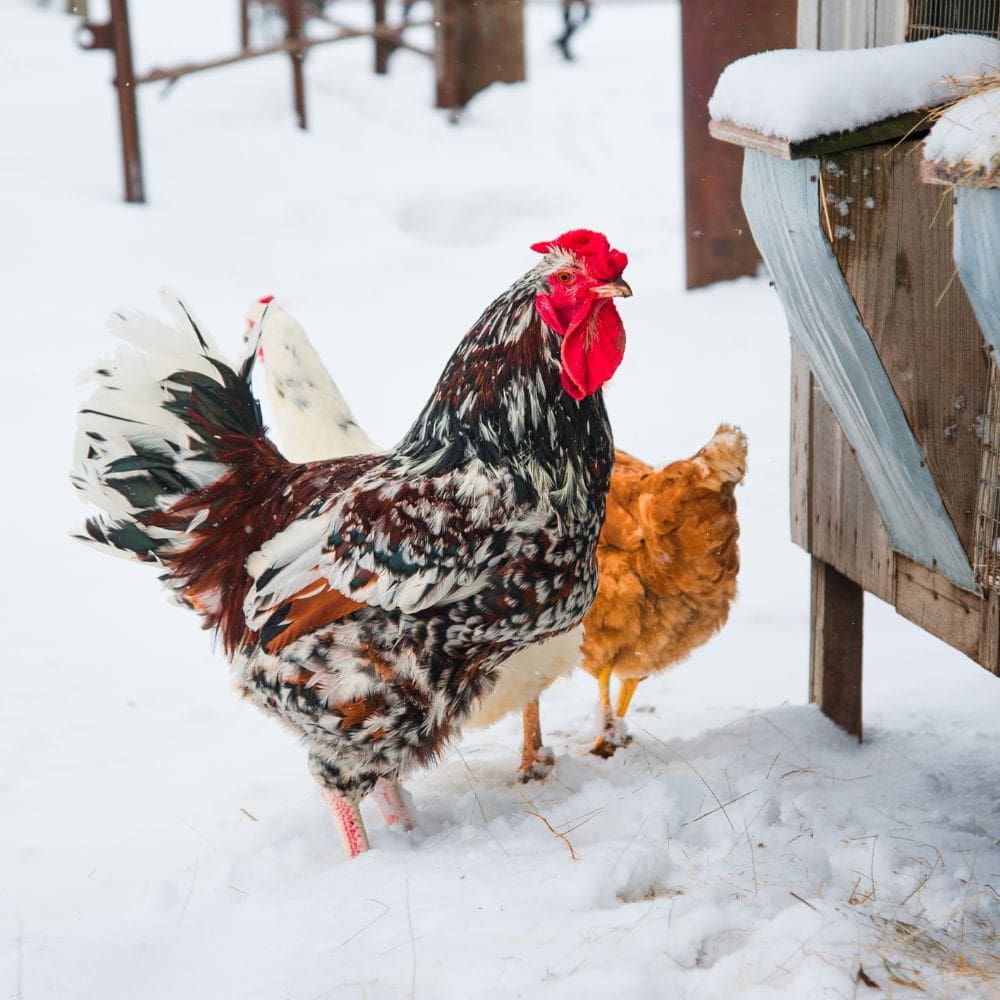
Table of Contents (Quickly Jump To Information)
How Cold is Too Cold For Your Chickens?
Your chickens are tougher than you might think. Even though they aren’t wearing big, puffy coats like us in the wintertime, they have natural defenses and conditions against the cold that can keep them warm.
Chickens have several types of feathers. There are wispy feathers and plumage feathers. The plumage feathers are the colored ones that are easiest to see when you quickly glance at your birds. The wispy feathers are similar to down in that they stick tightly to the skin and keep chickens warm, essentially creating an airtight barrier.
Not only that but chickens also have high metabolisms. They have higher resting temperatures than we do. While a human stays around 98 degrees, chickens are closer to 105 to 109 degrees Fahrenheit. Plus, their hearts beat a lot faster than ours – up to 400 beats per minute. This helps your birds stay warm even when you’re running toward the woodstove.
Depending on the breed, most chickens can survive inside an unheated, uninsulated coop at cool temperatures that are well below freezing. There’s no hard and fast number on how cold is too cold for chickens since there are so many variables that affect a chicken’s cold hardiness. Here are a few.
Breed
Some chicken breeds are naturally better at shaking the cold than others. Usually, chickens that are heavy and large will be better at staying warm. Some of the best breeds for winter weather include:
- Barred Rocks
- Salmon Faverolles
- New Hampshire Reds
- Rhode Island Reds
- Wyandottes
- Jersey Giants
- Australorps
- Welsummers
- Sussex
- Orpingtons
- Delawares
- Brahmas
Cold-hardy chicken breeds are those that have high body fat and don’t have any areas of exposed skin. Similarly, frizzles (or curly feathers) along with feathered feet can make chickens more sensitive to the cold. Breeds like Silkies, which don’t dry out easily in cold, wet weather or when there is a draft in the coop are harder to care for in frigid weather.
Weather Conditions
It can be tough to determine how cold your chickens can get because it’s not just the temperature you’ll need to keep an eye on. Chickens tend to be more sensitive to humidity and moisture than actual cold.
In almost all cases, chickens will handle dry, cold weather better than wet, cold weather. This is especially true if your coop tends to hold moisture. A driving wind can also lower the ambient temperature and make it more difficult for your chickens to stay warm, too.
Age and Life Stage
Finally, consider how old your chickens are (and whether they are in any particular stage of life that would make them more sensitive to the cold).
For example, young birds and those who are molting may not have as many feathers to withstand the cold. You’ll need to take a few extra steps to keep them warmer during unusually cold weather. You can read more about the ideal outdoor temperature for baby chicks here.
How to Help Your Chickens Stay Warm
Avoid a Heater
The number one tip to remember when helping your chickens stay warm is that nine times out of ten, they do not need a heater.
Heaters are problematic for several reasons. First, with all that bedding, you’re inviting a fire. Chickens do not need a heater because they will huddle up together on a cold night to stay warm. A well-ventilated coop with plenty of fresh bedding (and a proper ratio of roost bars to chickens) is all your birds need.
Another issue with a heater is that, if the power goes out (or when your chickens venture outside) they will suffer from the fluctuation in temperature. Your chickens don’t have a hard time acclimating to the cold when it’s always cold out -but when they can’t adjust to sudden swings, that’s when health problems arise.
As long as your coop is well-ventilated, it doesn’t need to be insulated, either. Too much insulation can be detrimental because it makes it difficult for moisture to escape. Believe it or not, chickens release a lot of moisture when they breathe, so a too-tight coop can lead to moisture build-up in the coop. This will chill your chickens much faster than the cold weather will.
The same goes for heating pads. One member of the Chicken Vet Corner group writes:
Heating pads raise humidity, increasing the chances of frostbite, and make temperature differences inside the coop verses outside the coop harder for the chickens to deal with. Unless you have -30 degrees or colder weather, don’t even use them
Susan Toler
Try Deep Litter
Deep litter is a method of bedding that allows bedding material and chicken manure to build up over the year. By winter, you’ll have a foot or more of composting material on the floor of the coop. As you probably already know if you have a compost bin, the composting bedding will give off heat and will warm the coop naturally. You can clean it out come spring.
One tip for the deep litter method – don’t neglect the nest boxes. Although your chickens should do just fine with a bit of built-up litter, the nesting boxes still should be changed out on a regular basis. Consider adding some nesting herbs like these, while you’re at it!
Feed at Night
Take extra care to feed your chickens at night during particularly cold spells. If you give them high-energy, high-protein foods, like cracked corn or seeds, they’ll stay warmer overnight as their stomachs work to digest the food.
An occasional treat like sunflower seeds is a great way to help your chickens build their body heat and raise their body temperatures to withstand cold temperatures with ease. It’s not a bad idea to up the food intake of your chickens and provide extra feed during this time, anyway.
Consider providing your chickens with some high-energy treats inside the coop at night, like these mealworms. Your hens will go crazy for them!
Keep Them Occupied
Make sure your chickens are kept entertained during the day – the activity will boost their metabolisms even further, helping to keep the hens warm. Ideally, you should let your chickens out of the coop to roam around during the day, but you might find that, when it’s super snowy, your chickens don’t want to venture outside (although the cold does not bother them, they aren’t fond of walking in heavy snowpack).
If your chickens can’t be encouraged to go outside in cold conditions, consider hanging a head of cabbage by some twine in the coop. This will entertain your chickens on the darkest days of winter.
Harness the Power of the Sun
Consider adding a sunroom to your coop. It can be simple or elaborate and you can find many ideas online fo this.
A coop with plenty of natural lighting is best, as this will help warm the coop during the day (and the coop will hang on to some radiant heat at night, too). You can also build a cold frame-style addition to your chicken coop or run by covering a section with clear, heavy-duty plastic. Basic tarps should work, too.
This will give your chickens somewhere to relax in the sun during the day – and as a side bonus, it will usually stay free of snow, too. It also offers shelter against intense winds.
Don’t Forget the Roosts
Chickens don’t need a heater! Again, they just need a place to perch. The key to warm chickens is a good roost set-up. The roosts will not only keep chickens off the cold ground (ideally, two to three feet off the ground) but they will also allow the birds to huddle together.
When chickens are able to roost properly, they’ll be able to use their feathers and bodies to cover up their cold-sensitive feet, too.
Guard Against Frostbite
As long as your chicken coop is well-ventilated, you shouldn’t have to worry about frostbite. However, in the coldest winter climates, some breeds of chickens that have large wattles and combs may develop frostbite. Luckily, it’s nothing serious – it will just cause some discoloration on these parts of your birds.
However, you can protect against it by dabbing some petroleum jelly on the wattles and combs. It forms a moisture-resistant barrier. You can read more about this here: Chicken Frostbite & Care
Plan for Laying Declines
Your hens’ laying patterns will naturally decline during the winter – that is only to be expected. It is caused not only by a reduction in natural daylight hours but also by the fact that your chickens are spending more calories on staying warm than they are on producing eggs.
If you’re really concerned about a drop in egg production, you can add a light to the chicken coop. This is really only for your benefit, though – the chickens don’t necessarily need it.
One tip – if your laying decline continues past the extreme cold weather, you may want to give your girls a boost by adding some egg-production nesting herbs to the nesting boxes. Here’s a great option – the girls are sure to love them!
Fresh Water is Essential
Your chickens will naturally eat a bit more during the winter months, since they don’t have access to fresh forage and they need to eat just to stay warm, too. Make sure they have consistent access to feed and remember – without water, the feed is pointless.
One of the biggest challenges of raising chickens during the winter is having to deal with frozen waterers. Consider using waterers with heated bases to help prevent the waterers from freezing even in below-freezing temperatures. Don’t forget to refill often – eight chickens need at least a gallon of water per day.
You can use heated livestock containers or even make do with simple swaps, like heated dog water bowls.
Should I Insulate the Chicken Coop?
Your chicken coop does not need to be air tight, nor do you need to worry about stacking straw bales around the outside. Extra modifications aren’t needed.
In most cases, as long as your chickens are well-bedded and have each other to rely on to keep the flock mates warm, no extra insulation is needed. It’s your personal decision, of course, whether you want to take this step in preparing your chickens for winter but most of the time, it’s unnecessary.
A coop that is bundled up too tight can lead to extra problems. Too much insulation can trap air and lead to problems like frostbite and moldy bedding. Airflow is key so do your best to eliminate drafts and reduce excess moisture. Beyond that no other steps are necessary.
Sick or Injured Chickens
The one exception to chickens in cold weather has to do with those who are sick or injured.
No matter what kinds of chickens you are raising, even one of the most cold hardy breeds, it’s important that you exercise some common sense and bring your chickens inside if they are suffering from some sort of physical or health issue.
You don’t need to snuggle up in bed next to your favorite hen or rooster, of course, but you can bring them into the garage or another area with some supplemental heat until they recover.
Remember, baby chicks also need to be kept indoors under supplemental heat until they are old enough to be outside.
Plus, if you have a sick bird, you really shouldn’t have it hosued with the entire flock, anyway. This can spread disease and make it more likely that your sick bird will be picked on.
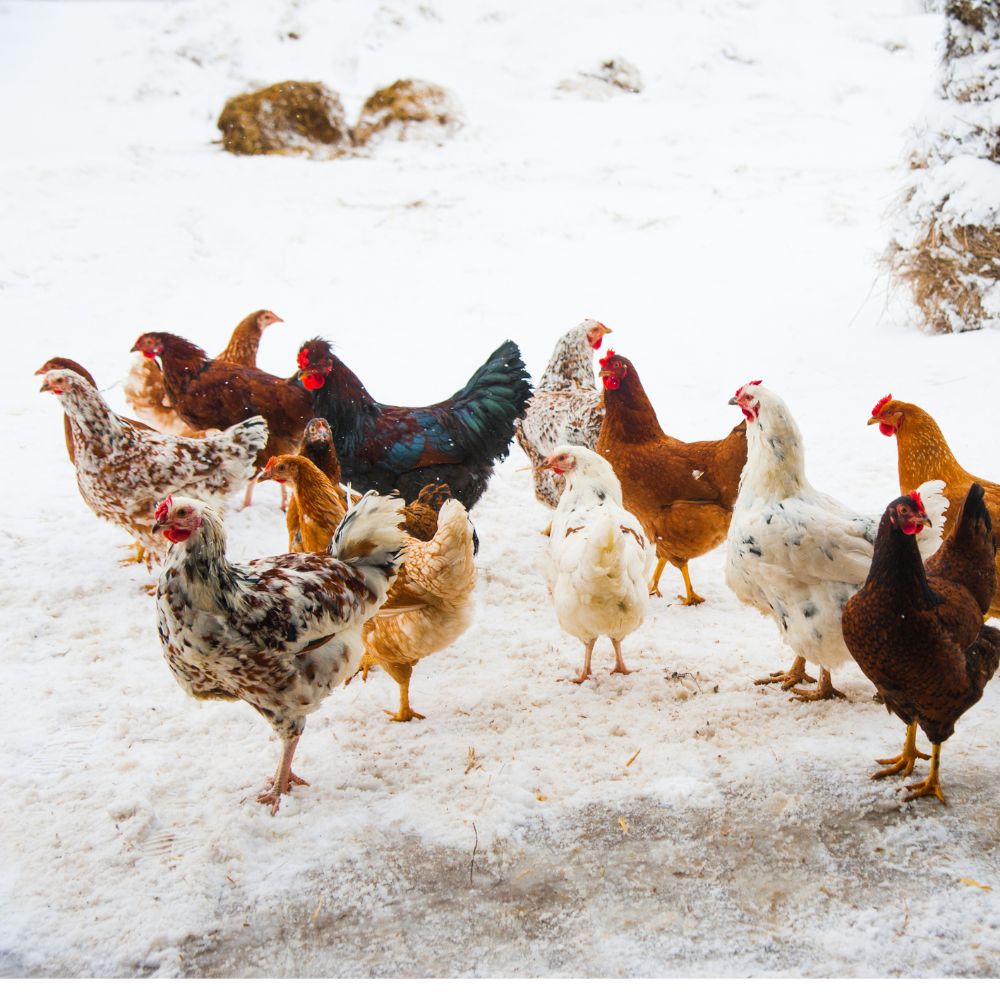
Summary
When it comes to raising chickens during the winter, you’ve got to give them some credit – they’re tougher than you might think! And they’re a lot tougher than humans without any extra heat for sure.
In fact, one member of the Chicken Vet Corner group writes:
I live in Ontario and have never ever heated my coop in any way, it is not insulated and there’s a 1×1 completely open window covered in hardware mesh in it…. even in the dead of winter my birds don’t get frostbite. I find heat lamps or heat of any kind don’t let the birds become adjusted to the cold and gives them a much worse chance of frost bite.
You also have to think of the shock that a power outage might cause… The only important things are providing wide roosts that their toes don’t wrap around, lots of ventilation and a fairly small sized coop for the number of birds in it. Moisture is the enemy, not cold. Too many heat sources cause unnecessary moisture.
Annie Page
While there will be some extra work involved when you are raising chickens during the winter, ultimately, the stress will be on you and not on them. Collect eggs a few more times during the day and make sure the waterers stay thawed out. Otherwise, your chickens will hardly even know that it’s winter outside!
Related Articles
- Easy Clues Your Baby Chick Might Be Sick
- Introducing Chicks to Adult Chickens
- Build A Chicken Coop That’s 100% Predator Safe
- 5 Immune Supporting Herbs For Backyard Chickens
Maat van Uitert is a backyard chicken and sustainable living expert. She is also the author of Chickens: Naturally Raising A Sustainable Flock, which was a best seller in it’s Amazon category. Maat has been featured on NBC, CBS, AOL Finance, Community Chickens, the Huffington Post, Chickens magazine, Backyard Poultry, and Countryside Magazine. She lives on her farm in Southeast Missouri with her husband, two children, and about a million chickens and ducks. You can follow Maat on Facebook here and Instagram here.


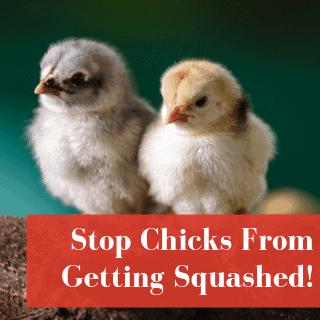
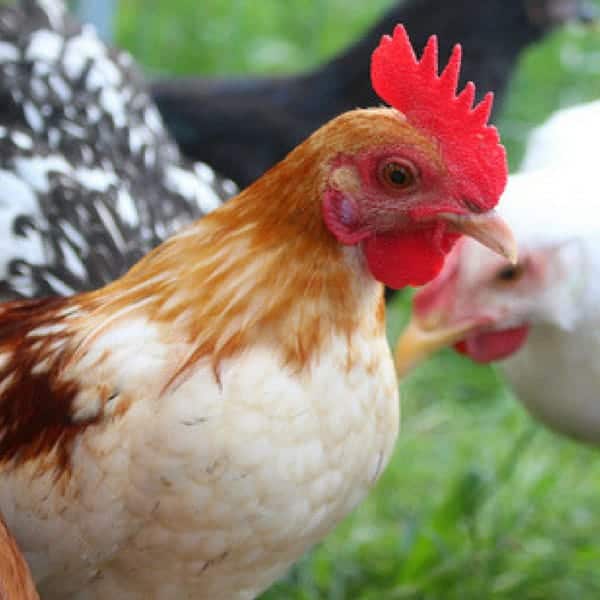

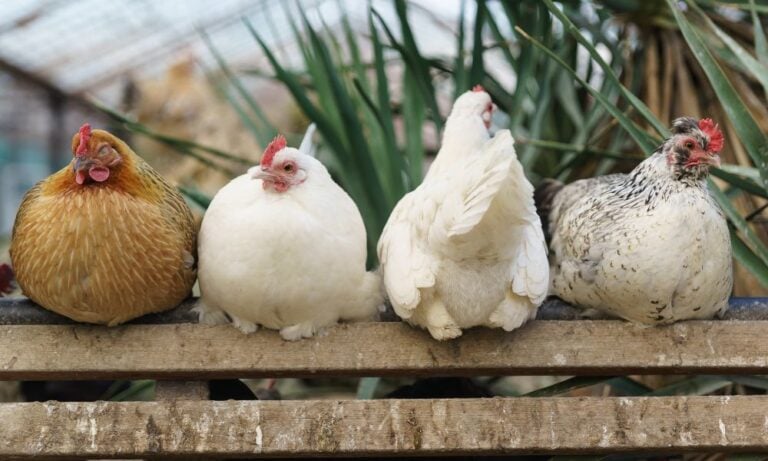
![Is My Hen Laying Eggs Yet?! Decoding Her Tell-Tale Signs (Plus Ideas To Use & Preserve Eggs) [Podcast]](https://thefrugalchicken.com/wp-content/uploads/2016/03/how-to-tell-if-my-hens-are-laying-feature-min.jpg)